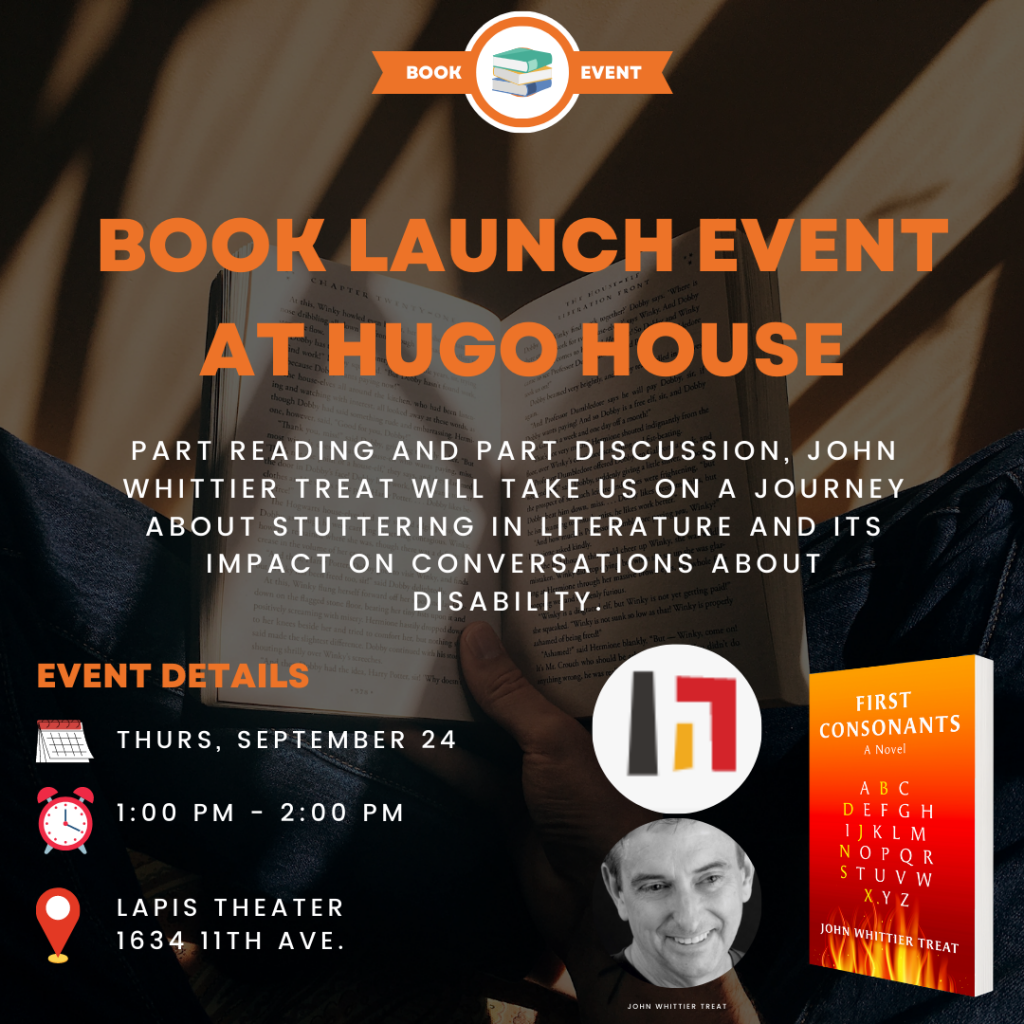Depending on how you look at it, my essay title is either inspired by Tony Hoagland’s wonderful collection of poems What Narcissism Means to Me or it’s a straight knockoff. If not every word in the title, then at least the spirit and the idea of it. Curiously, book titles aren’t fully protected under US copyright law. They’re not accorded the same rights as, say, trademarked business names like OfficeMax and Walmart. In theory, if you wanted to write a 1300-page novel called War and Peace or a Victorian thriller called Frankenstein, you could do it. You might have a harder time if you wanted to publish a book with Harry Potter in the title; some titles are deemed so recognizable and profitable that they constitute trademarks in their own right. Tolstoy and Shelley are unlikely to sue for trademark infringement, but I’m pretty sure Harry Potter and the Incorrigible Teapot gets a sharply worded letter on law firm stationery.
Swiping a title from another writer might be the most obvious and visible form of literary theft but it’s not the form that gets everyone talking. What banishes you quickly — and loudly — from the embrace of the literary world are things like inventing quotes by real people in a work of nonfiction, or copying phrases, ideas, and/or entire passages from another writer without appropriate attribution.
Every few years, a plagiarism scandal breaks and a haggard, disgraced writer is paraded through the media, sometimes across the very pages they’ve hoodwinked and hijacked. Remember Stephen Glass, Jonah Lehrer, and Kaavya Viswanthan? I do. A journalist friend and I have talked for hours about their plights. We’ve also talked at length about our own personal code of ethics on literary influence.
After fabricating stories for The New Republic and Harper’s in the late 1990s, Glass has been trying to gain admission to the California bar for years. Picture him walking away from journalism and working as a paralegal for a Beverly Hills law firm. The California Supreme Court heard arguments recently about whether he should become a practicing lawyer on moral grounds. Convicted felons can rehabilitate and go on to win public office, but do we accord plagiarists the same right?
Kaavya Viswanathan, the college freshman who sold a largely plagiarized novel called How Opal Mehta Got Kissed, Got Wild, and Got a Life, also went to law school after her book was pulled from the paper streams and she finished her undergraduate studies at Harvard. Last I saw on Google, she landed a summer associate position a few years back with a prestigious law firm. Jonah Lehrer, meanwhile, recently sold a book proposal about the neurology of love to Simon & Schuster after his book Imagine was shown to contain invented quotes from Bob Dylan. He also left his position as a staff writer at The New Yorker when he was found to be recycling posts — his own and others —between media outlets. When he was paid $20,000 by the Knight Foundation to give a speech about his downfall earlier this year, a handful of journalists were horrified and expressed their disgust publicly.
Why have I tracked all these literary fates? Why does plagiarism keep me awake at night?
Perhaps it’s because I’m working on a novel about a woman who restores 17th century paintings and who may, or may not, have helped to create a forgery, that I’m particularly attuned to layers of deceit right now.
That’s part of it.
Or is it because I secretly fear that I’m a fake, that anything I do is derivative in some way? Maybe. But it seems to me that writers have always stolen from each other, it’s just a question of how overtly and how artfully.
Maybe I have a deathly fear of plagiarism because I understand how easy it would be to follow that breadcrumb trail. First a lovely phrase dropped into the pocket, then a whole sentence stuffed into your waistband. Pretty soon you’re walking through the woods clothed in nothing but someone else’s beautiful or harrowing words.
This seems more likely.
After teaching a few hundred undergraduate writing students at a handful of universities, I’m struck by how little plagiarism is understood and how powerfully it “rasps the spine” (thank you, Virginia Woolf) of so many writers and teachers. All of my colleagues have handled plagiarism cases in their classes; it’s a cottage industry that’s spawned its own specialized websites and algorithms. See a sudden uptick in diction or fluency in a student paper or story and you can run that bad boy through an online dragnet. When you confront the plagiarist it’s a script written for daytime television — “I accidentally forgot to insert the references,” or “What a weird coincidence. Great minds think alike?”
Despite the fact that there are guideposts for avoiding plagiarism — copyright law and Fair Use, academic conventions, codes of ethics — none of them adequately give the writer an ironclad system. Interestingly, Jonah Lehrer discussed the need for a “standard operating procedure” to avoid plagiarism when he gave his speech for the Knight Foundation. Surely, we might say, any writer knows when he’s making up Bob Dylan quotes and pasting text from one column to another. Yes, but Lehrer’s counterargument is simply that he can’t be trusted to do the right thing, therefore he needs a system of checks and balances in place.
Most writers, of course, have a system. They footnote, they attribute, they acknowledge a source. It’s harder to do all these things within the folds of traditional fiction — if I echo a famous line perhaps I can trust the reader to pick up that it’s an allusion. But if I closely approximate a piece of beautiful language from a Woolf or DeLillo novel, how will anyone know except me?
What’s difficult to teach new writers is that there’s a whole gray area, a dotted line between influence and theft. This is especially true for the fiction writer.
Consider these lovely sentences from the beginning of James Salter’s novel Light Years:
The day is white as paper. The windows are chilled. The quarries lie empty, the silver mine drowned.
Perhaps I stumble upon these while working on my own novel and they get my writer brain churning. There’s something here that I like, that I want to bring into a particular description of winter or desolation.
We can all probably agree that if I write “The day is white as paper” or “The day is paper-white” that I have stolen Salter’s line. His voice as an artist is imbedded in the simile, in his choice of words to anchor his comparison. But let’s also agree that generally the smallest unit of a writer’s voicing is the phrase, not the word. No one can lay claim to white or chilled or drowned or even the silver mine. But if I were to pull those five words and use them side by side, I’m in danger of too closely approximating Salter’s passage. For example, “Everything about the day was white. The windows took on a chill. The stone quarries were empty now, the old silver mine underwater.” While I’ve avoided his exact phrases and the initial comparison, I’m still writing in his tracks, following his footfalls across my own empty page. This is a strain of plagiarism, not inspiration.
The “standard operating procedure” for writers to avoid plagiarism is to derive inspiration from the greatness of other writers but to transpose and reinvent that inspiration. Our job is to see what Salter has done and repurpose it so fully that it bears little resemblance to the original. This is why close paraphrasing isn’t permitted under copyright law or academic standards of conduct. Merely providing an occasional substitution of a word while following the logical tracks of another writer is a highly derivative act. If reading is thinking with someone else’s mind (paraphrasing, I think, Schopenhauer) then close paraphrasing is writing with someone else’s ink.
Let’s return to the passage. Surely “The windows are chilled” is fair game. Well, if I throw this sentence into Google Books, it actually only comes up for Salter. Meanwhile, “chill windows” appears in a number of books. Part of Salter’s expression as a writer is to frame his sentence in a particular way. But since he’s not the first one to describe windows as being chilled, I can add this to my writing backpack — the idea of chill windows in winter. The sonic attributes of chill and windows might add a drowsy quality to the prose that reinforces a particular mood, say, or the depth of winter. Now I’ve learned something from Salter, not simply imported his phrasing.
And just like you’d be accused of borrowing someone’s else fashion style if you wore the same hat, shirt, and shoes to a party, you’d also be accused of copying if you wore silver mine, chill windows, and a white day all within the same few lines. Let’s face it, it’s highly unlikely that anyone but you would know — or find out — that you’d tracked Salter through the snow. Someone would really have to be scrutinizing the two passages side by side.
This is where plagiarism becomes a matter of deeply personal ethics. We should avoid it not merely because we fear being caught, or disgraced, but because avoiding it with great vigilance might well make us better artists. By asking whether you’ve followed too closely in someone else’s thinking, phrasing, or style, you’re forced to understand where the unique energy or voicing in a sentence or phrase is coming from. Insisting that you transpose and reinvent is to internalize the thing that’s worthy of emulation.
Of course there’s also a level of inadvertent influence. When I was an undergrad at Iowa, Frank Conroy would visit our writing workshops every now and then and remind us that when you sit down to write everything you’ve ever read and absorbed leaks onto the page. I’ve put “fidget wheels” into two different historical novels without realizing I’d absorbed it from a Kenneth Slessor poem. At the time of writing, I thought it was a common 19th century phrase or object. Then, I felt scalded by a re-reading of Slessor’s “Five Bells” — Time that is moved by little fidget wheels/ Is not my time, the flood that does not flow.
We can’t be blamed for being under the sway of other writers or forgetting that a particular phrase came to us as invented and full-formed. But our job is to be vigilant against that forgetting.
All writers pass through the needle of influence, start out writing stories that sound a lot like Hemingway or George Saunders or Raymond Carver. That’s a normal stage of development, even an essential one. So when I tell my students to type out the first page of their favorite novel, I’m asking them to thrill to the rhythms, cadences and diction of a master at work. I do this to open them up to the possibility of influence, but also to make them profoundly aware of it.





